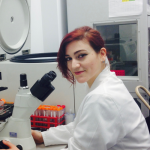Dr Michael Lovelace and his team have been working for two decades on the role of the kynurenine pathway in MS. This biological pathway breaks down the amino acid tryptophan in the body and produces toxic metabolites that correlate with increased disability in the blood and fluid which surrounds the brain and spinal cord of people with MS. The research team has shown that the products of the kynurenine pathway can also affect development of natural stem cells in the brain. This opens up an entirely new field for the kynurenine pathway in MS, through its ability to modulate repair via stem cells.
Previous work undertaken by this group have also shown that the toxic metabolites can be neutralised using other ‘inhibitor’ molecules when applied to cells grown in the laboratory. This work is now at an exciting stage where testing needs to be carried out on cells taken from human brain tissue. This award will allow Dr Lovelace to visit the laboratory of Professor Jack Antel at McGill University in Canada to receive training in a technique where the human cells that produce myelin in the brain are isolated from tissue taken during neurosurgery. The cells obtained using this technique will allow Dr Lovelace to determine whether inhibitors of the kynurenine pathway are effective in these cells and whether it is possible to use these inhibitors to enhance the brain’s capacity to repair myelin lost in MS.
Updated: 1 February 2017
Dr Michael Lovelace
$6,000
2017
1 year
Past project

